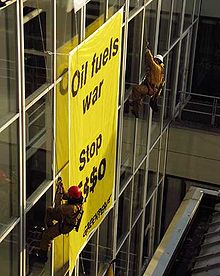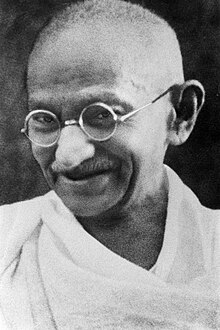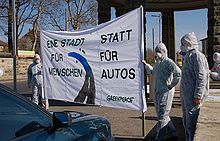Nonviolent Action

As a non-violent action (GA, English nonviolent action ) are all political or social resistance and confrontation forms referred to consciously renounce violence against other people ( non-violence ). Gene Sharp has classified the methods of GA into the following subgroups:
- nonviolent protest and conviction
- social non-cooperation
- Boycotts
- Strike actions
- political non-cooperation
- nonviolent intervention
The spectrum of the 198 forms of action compiled by him ranges from letters of protest and leaflets to demonstrations, rallies , sit-ins, street theater , calls for a consumer boycott , strikes, “ following the rules ” to calculated rule violations and certain forms of property damage.
Depending on the legal system and government of the country in which these methods are used, the forms of action mentioned can lead to direct violent reactions by state forces and have criminal consequences for those involved.
Examples


Aldous Huxley published the book An Encyclopaedia of Pacifism in 1937. Below is an excerpt from the lemma 'Non-Violence' in a translation:
“Nonviolent resistance does not mean doing nothing. It means making the tremendous effort it takes to overcome evil with good. This effort is not based on strong muscles and diabolical weapons: It is based on moral bravery, on self-control and on the steadfast, tenacious awareness that there is no human being on earth - as brutal as personal hostile he may be - without an innate foundation of goodness without love of righteousness, without respect for truth and good; all of this is achievable for anyone who uses the appropriate means. "
Famous examples of nonviolent actions are the salt march initiated by Gandhi in the Indian struggle for independence and that of Martin Luther King Jr. with organized Montgomery Bus Boycott . A discussion was held in War Resisters International (WRI) in the 1960s . Emmeline Pankhurst developed a concept of nonviolent resistance for the women's movement , which included hunger strikes .
If methods are deliberately used that are illegal in the country concerned, it is civil disobedience .
Germany
In Germany there are discussions on the nonviolent revolution in the groups around the magazine Graswurzelrevolution and in the International of War Service Opponents (IDK). Numerous associations and initiatives in Germany deal with the theory and practice of nonviolent actions, including the Federation of Nonviolent Action Groups (FöGA), the Workshop for Nonviolent Action Baden , the Federation for Social Defense , the Mutlangen Press Hut , the Wustrow Curve , the Archiv aktiv . The magazines "Nonviolent Action" and "Graswurzelrevolution" deal with the theory and practice of the GA.
Well-known German examples are the actions against the NATO double decision of December 12, 1979 to station “ Pershing II ” and “ Cruise Missile ” missiles in the Federal Republic and the Monday demonstrations in 1989/1990 in the GDR .
Web links
- Workshop for Nonviolent Action Baden
- Federation for Social Defense
- Press hut Mutlangen
- Grassroots Revolution
- "Nonviolent Action" at Lebenshaus Schwäbische Alb
literature
- Sharp, Gene: Methods of Nonviolent Action. Boston 1973, ISBN 0-87558-071-8 .
- Sharp, Gene: From Dictatorship to Democracy - A Guide to Liberation. The textbook on the non-violent overthrow of dictatorships. Beck, Munich 2008, ISBN 978-3-406-568176 .
- Wolfram Beyer (eds.), G. Lakey, M. Randle: Nonviolent Revolution - Contributions for a society without domination. Oppo, Berlin 1988.
- Nonviolent direct action - leaflet on the website of netzwerkB .
- Tempel, Konrad inciting nonviolence. About ways of mindful practice and spirituality. Aphorisma, Berlin 2008, ISBN 978-3-86575-005-1 .
- War Resisters' International (ed.): Handbook for Nonviolent Campaigns . Verlag Graswurzelrevolution, Heidelberg 2017, ISBN 978-3-939045-32-8 .
Individual evidence
- ↑ Gene Sharp: From Dictatorship to Democracy - A Guide to Liberation. The textbook on the non-violent overthrow of dictatorships. Beck, Munich 2008, p. 101.
- ^ German: Plea for World Peace and Encyclopedia of Pacifism, Knaur 1993.
- ^ Howard Clark: Nonviolence and Revolution. Ways to fundamentally change society. International Publishers of War Service Opponents, IDK, Berlin 2014.